Honorary doctorates
Learn who we have recognised tor their significant contribution to the University, the Waikato region, and the wider New Zealand community.
Alongside a Distinguished Alumni Award, an Honorary Doctorate is the most prestigious award that the University of Waikato can bestow.
Lt Gen the Rt Hon Sir Jerry Mateparae, GNZM, QSO, KStJ
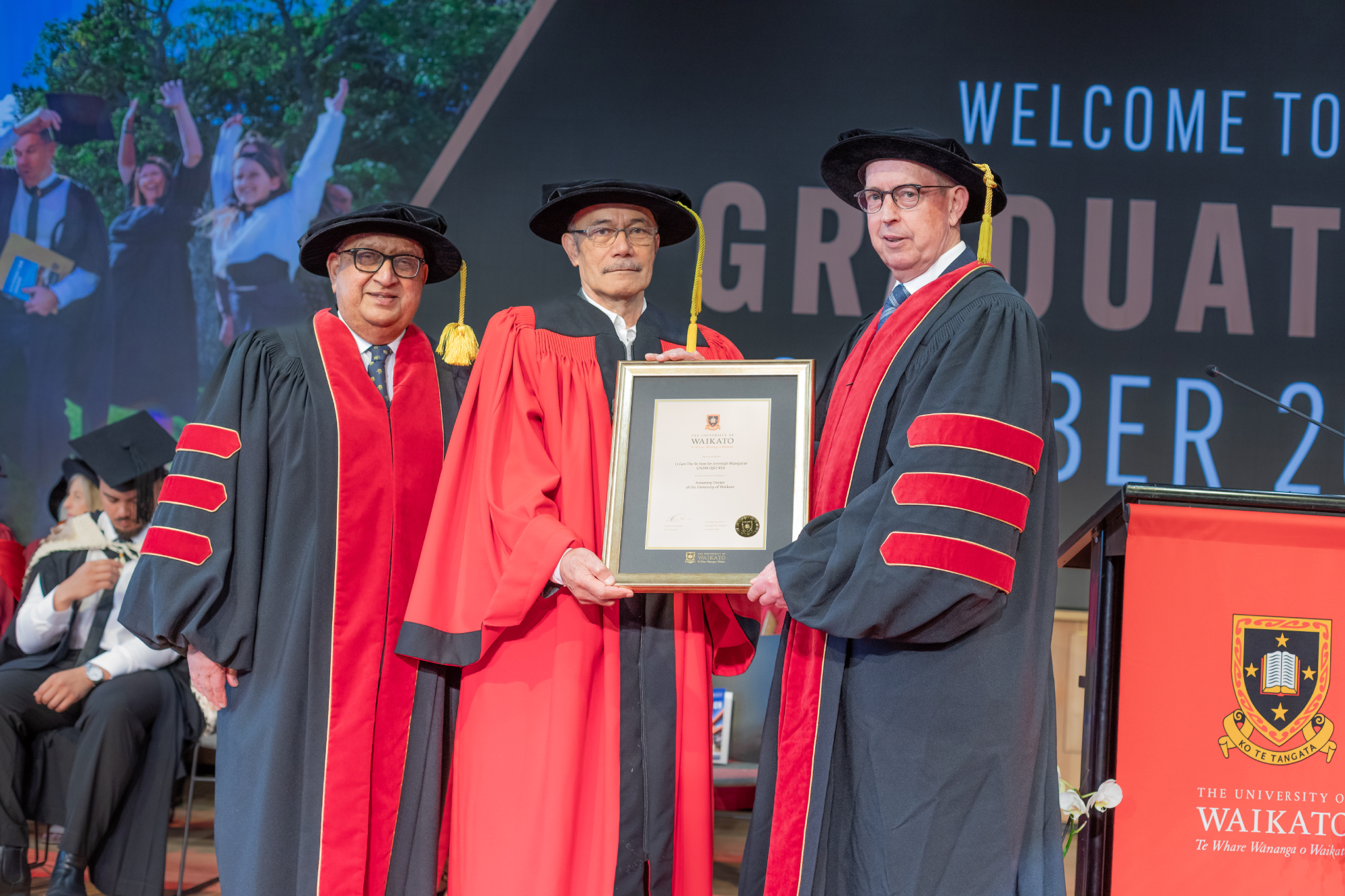
Honorary Doctorate conferred 15 October 2024
Lieutenant General The Right Honourable Sir Jeremiah Mateparae, GNZM, QSO, KStJ (Ngāti Tūwharetoa, Ngāti Kahungunu, Te Atihaunui a Pāpārangi, Ngāti Tamakopiri) is a former New Zealand Chief of Defence Force who served as the 20th governor-general of New Zealand.
Sir Jerry served for 39 years in the New Zealand Army including service in both battalions of the Royal New Zealand Infantry Regiment and the New Zealand Special Air Service. He was sworn in as New Zealand’s 20th Governor-General in 2011 and served in this role until 2016. On completion of his term as Governor-General, Sir Jerry served as New Zealand's 27th High Commissioner to the United Kingdom from 2017 to 2020, based in London. Since returning to New Zealand, he has been deeply involved in various patronage roles.
He also has a distinguished educational background, having completed a Master of Arts with First Class Honours in Political Science at the University of Waikato in 1996, which he undertook after graduating from the British Army Staff College (1989), the Australian Joint Service Staff College (1995), and the Royal College of Defence Studies (1999). He also holds a Graduate Diploma in Strategic Studies from the Australian Joint Services Staff College, Canberra and a Fellowship with the New Zealand Institute of Management.
Sir Jerry received the Darjah Utama Bakti Cemerlang (Tentera) Distinguished Service Order (Military) from the Singapore Government and was appointed a Grand Knight Companion of the New Zealand Order of Merit and a Companion of the Queen’s Service Order. He is also a Knight Grand Cross of the Order of the Crown of Tonga (KGCCT) and holds a Grande Colar de Timor Leste (GCdeTL). He has also been awarded a Distinguished Alumni Award from the University of Waikato and an Honorary Doctorate of Literature from Massey University.
Lady Tureiti Moxon
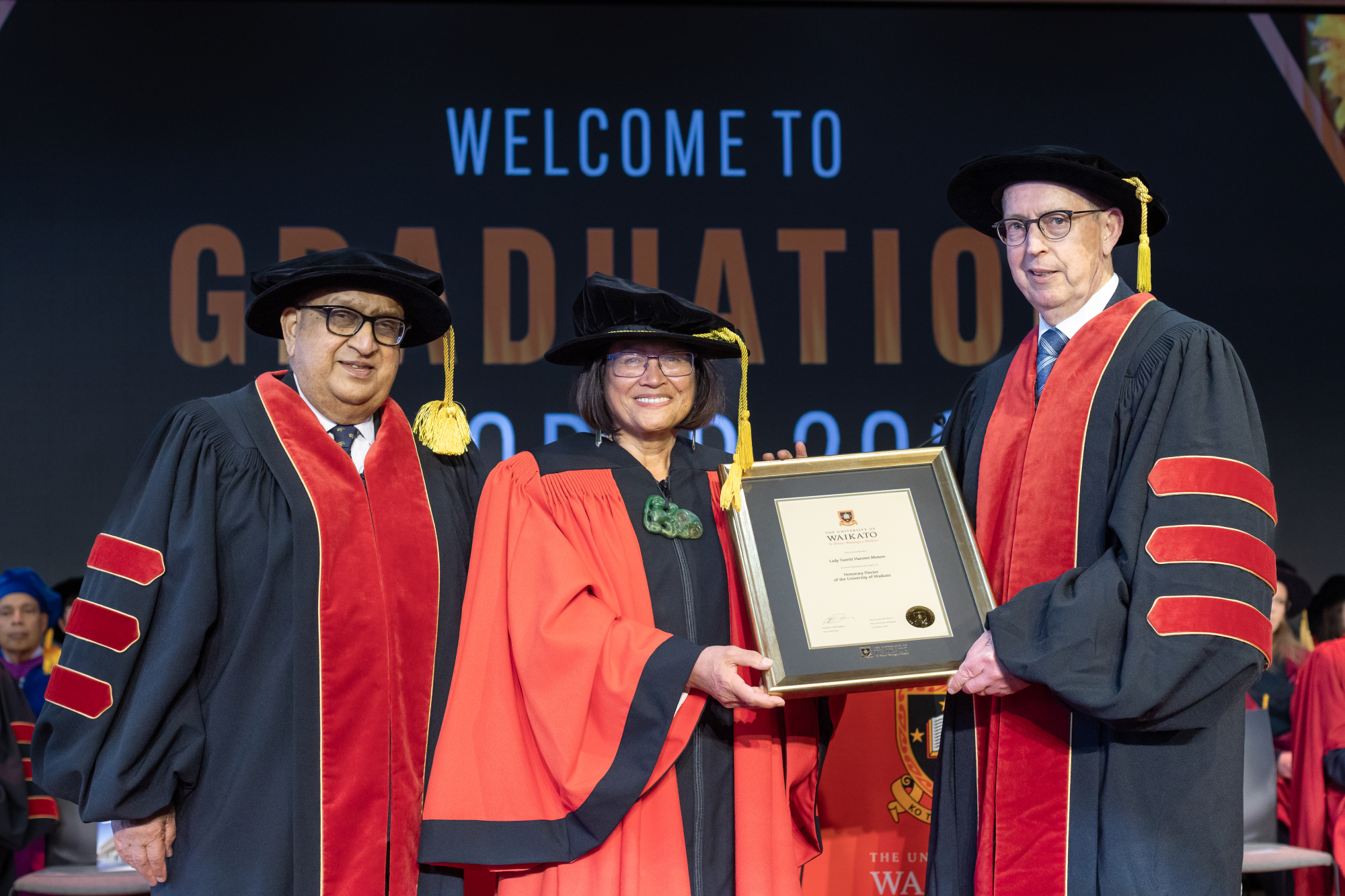
Honorary Doctorate conferred 15 October 2024
Lady Tureiti Moxon (Ngāti Pāhauwera, Ngāti Kahungunu, Kāi Tahu) is a health leader and campaigner who has dedicated more than 25 years so far to the transformation of Māori healthcare and advocacy in New Zealand.
After graduating from the University with a Certificate in Māori Studies and a Bachelor of Laws in 1990 and 1998 respectively, Lady Tureiti practised as a barrister and solicitor specialising in Māori land law, civil matters and Treaty jurisprudence. Since 2002, she has led marae-based provider of kaupapa Māori services Te Kōhao Health.
In collaboration with the University of Waikato, Lady Tureiti has worked on initiatives like the He Pikinga Waiora project, which addresses pre-diabetes, cardiovascular disease and obesity through community-led initiatives.
Lady Tureiti is a Chartered Fellow of the Institute of Directors and has chaired the National Māori Urban Authority, served on the Waitangi Tribunal and was previously on the board of the Māori Health Authority – Te Aka Whai Ora. In recognition of her contributions, she received the Te Tupu-ā-Rangi Award for Health and Science at the Matariki Awards in 2020.
The Honorable Te Ururoa James William Ben Flavell
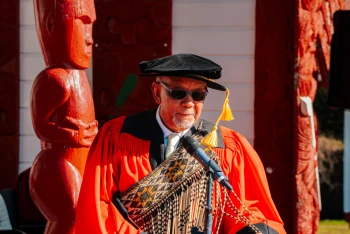
Honorary Doctorate conferred 27 July 2024
The Honorable Te Ururoa James William Ben Flavell (Ngāti Rangiwewehi, Ngāti Ngararanui, Ngāti Raukawa, Ngāti Te Ata and Ngāpuhi) is a prominent leader and advocate for Māori communities, education and wellbeing in Aotearoa New Zealand.
His career as an educator spans kohanga, kura kaupapa, secondary and tertiary levels, where he has significantly influenced the advancement of te reo Māori, tikanga Māori and Māori development.
In 2018, Te Ururoa served as a Professorial Fellow at the University, contributing to Māori and New Zealand politics, Māori leadership and business development. He also leads the delivery of Te Āhurutanga, the Māori student leadership programme.
As a Member of Parliament for the Māori Party from 2005 to 2017 and co-leader from 2013, Te Ururoa championed the goal of simultaneous translation in Parliament and the Māori Language (Te Reo Māori) Act in 2016, which was enacted in both Māori and English. His enduring contributions to Māori development and te reo Māori have left a significant impact on the nation.
Sir Paul Adams, KNZM
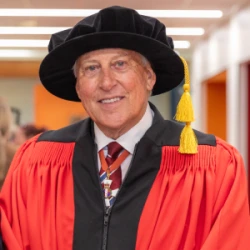
Honorary Doctorate conferred 23 April 2024
Sir Paul Adams KNZM is a highly successful civil engineer, businessperson, entrepreneur and philanthropist. He is one of New Zealand's leading developers of land, housing, commercial property and public amenities that have contributed to community and economic growth throughout New Zealand, particularly in Tauranga and the Bay of Plenty.
The number of patronages, trusteeships, directorships and leadership positions in private companies, not-for-profit organisations, crown entities, state-owned enterprises and charitable and community organisations held by Sir Paul is immense.
As a member of the University of Waikato Council from 2015 to 2017, including a period as the Chairperson of the Campus Development Committee, Sir Paul was directly involved in the planning, fund approaches, land acquisition and development of Stage 1 of the Tauranga campus. He and Lady Cheryl continue to support the University’s property acquisitions in the Tauranga City Knowledge Precinct. Sir Paul is currently a trustee of the University of Waikato Foundation.
Sir Paul was appointed a Companion of the New Zealand Order of Merit in 2015 for his services to business and philanthropy and in 2019 he was appointed a Knight Companion of the New Zealand Order of Merit for his continued service to philanthropy and the community.
Sir Harawira Gardiner
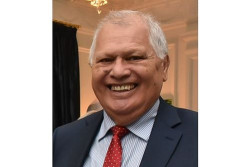
Honorary Doctorate conferred 19 November 2021
Sir Harawira Gardiner held numerous leadership positions during his long career, including as a former Lieutenant Colonel in the New Zealand Army, national director of Civil Defence, founding director of the Waitangi Tribunal and founding CEO of the Ministry of Māori Development.
Sir Harawira made a huge contribution to iwi settlements, having earned a reputation early in his career for his willingness to take on high-profile and often challenging positions. He was Crown Facilitator for Tūhoe and Kahungunu ki te Wairoa, Tūwharetoa Hapū Forum and Whakarewarewa Joint Trust, and a negotiator for Maniapoto. He was the fourth ministerial appointee to the Council of Te Wānanga o Aotearoa.
He chaired the Tertiary Education Commission and the Board of the Museum of New Zealand Te Papa Tongarewa. He chaired the Local Government Commission and was a director for Healthcare New Zealand Ltd. He was also the Crown lead for the development of policy on water, trustee of the Astrolabe Trust and Principal Advisor to the Office of the Kīngitanga.
In 2008, Sir Harawira was made a Knight of the New Zealand Order of Merit for his contribution and services to Māori.
Sir Harawira also wrote several books, including a biography of the late former Minister of Māori Affairs Parekura Horomia, the history and tradition of haka, and two books on the Māori Battalion. His work, Ake Ake Kia Kaha E! Forever Brave, a history of B Company 28th Māori Battalion, was published in 2021.
Paul Hunt
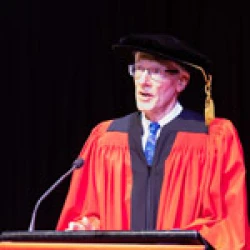
Honorary Doctorate conferred 25 June, 2021
Paul Hunt is New Zealand’s Chief Human Rights Commissioner. He is a human rights lawyer, a former University of Waikato senior lecturer, and has held a variety of senior UN human rights appointments.
Following a stint in civil and criminal litigation in the UK, Paul lived in the West Bank and Gaza Strip, researching the Israeli Military Courts from 1985-1987. In the UK he worked on an inter-denominational project on human rights in Britain and Ireland, before being appointed Associate Director of the African Centre for Democracy and Human Rights Studies in Gambia.
In 1992 he joined the University of Waikato’s Te Piringa – Faculty of Law as a senior lecturer, gaining a Masters of Jurisprudence with First Class Honours and publishing his thesis Reclaiming Social Rights: International and Comparative Perspectives in 1996.
He then went on to hold several senior UN human rights appointments, including Rapporteur to the United Nations Committee on Economic, Social and Cultural Rights from 1999-2002, and the first Special Rapporteur on the right to the highest standard of health. He was also Senior Human Rights Advisor to the Assistant Director General of the World Health Organisation. In October 2018 Paul was appointed Chief Human Rights Commissioner at the New Zealand Human Rights Commission.
Lisa Feldman Barrett
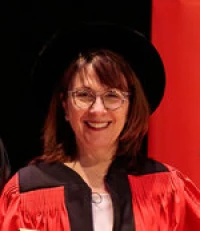
Honorary Doctorate conferred 3 March, 2020
Lisa Feldman Barrett is one of the world’s most renowned scientists in the field of human emotion. Her research has radically challenged the prevailing wisdom about how the human brain and body work together to create emotions.
A University Distinguished Professor of Psychology at Northeastern University, with appointments at Harvard Medical School and Massachusetts General Hospital, Dr Barrett is the current President of the Association for Psychological Science, a global organisation of more than 30,000 members. She is also an elected fellow of the American Academy of Arts and Sciences and the Royal Society of Canada.
In 2007 Dr Barrett was recognised with a US National Institutes of Health Director’s Pioneer Award for her research on emotion in the brain. She has also received a Mentor Award for Lifetime Achievement from the Association of Psychological Science and a Guggenheim Fellowship.
James Bolger, ONZ
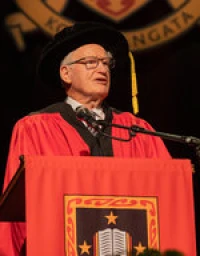
Honorary Doctorate conferred 10 December, 2019
The Right Honourable James Bolger, ONZ
James Bolger was the University of Waikato’s 12th Chancellor and served in the position for 12 years; the longest-serving Chancellor in the University’s history. Under his leadership, the University Council oversaw many significant capital projects including the refurbishment of the Library, now the Student Centre – Te Manawa, the completion of the Law building and Waikato Management School addition, and the opening of the University’s Tauranga CBD campus building.
During his prior 25-year career in politics, he was a Minister for 16 years, led the National Party for almost 12 years and had three consecutive terms as Prime Minister. During this time he saw the introduction of MMP, Treaty of Waitangi settlements, and the decision to fund Te Papa.
After leaving Parliament, Jim Bolger was ambassador the United States for four years. His worldwide connections have opened doors for the University to establish new contacts and take up teaching and research opportunities in other countries.
Derek Lardelli
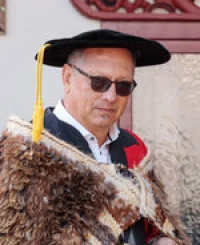
Honorary Doctorate conferred 3 May, 2019
Derek Lardelli (Ngāti Porou, Rongowhakaata, Ngāti Konohi, Ngai Te Aweawe) is one of Aotearoa New Zealand’s finest tā moko artists. He is also a painter, carver, kapahaka performer, composer, graphic designer and exceptional orator.
Based in Gisborne, Derek is founding principal tutor at Toihoukura, School of Māori Visual Arts at the Eastern Institute of Technology’s Tairāwhiti campus, where he has developed a suite of programmes across a range of Māori visual arts. He has consistently focused on the need to improve Māori educational outcomes using art as a medium.
Derek’s art is often very public, such as the design for Olympic and Commonwealth Games team uniforms and his work as cultural advisor to the All Blacks, including devising the haka Kapa o Pango.
In 2004 Derek received a New Zealand Arts Foundation Laureate award. He was the inaugural Gallipoli artist-in-residence in 2006, and was made an Officer of the New Zealand Order of Merit in 2008
Helen Clark, ONZ
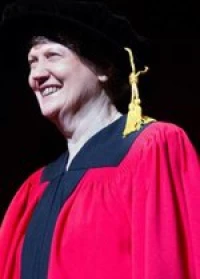
Honorary Doctorate conferred 12 December, 2017
The Right Honourable Helen Clark, ONZ
Helen Clark is one of New Zealand’s best-known and most highly regarded politicians, both in Aotearoa and around the world. Born in Hamilton, she retains strong connections to the Waikato region.
Following an early career as a Political Studies lecturer at the University of Auckland, Helen’s political career gathered pace when she became a Minister in 1987, going on to become Leader of the Labour Party in 1993 and Prime Minister in 1999. She was the first woman to win the office of Prime Minister at an election and went on to serve three successive terms.
In 2009, Helen Clark became the Administrator of the United Nations Development Programme, the first woman to lead the organisation. She has received a number of honours and awards, including a Peace Prize from the Danish Peach Foundation, the Star of the Solomon Islands, and appointment as a Member of the Order of New Zealand.
Maxwell Gimblett, ONZM
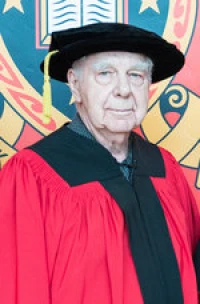
Honorary Doctorate conferred 15 October, 2017
As an artist, scholar, teacher and philanthropist, Max Gimblett has forged a record of artistic achievement unmatched by any other New Zealand artist in terms of international practice and exposure, while at the same time developing a consistent and passionate following in New Zealand.
Max studied art at the Ontario College of Art and the San Francisco Art Institute, as well as psychology at the C.G. June Foundation in New York, becoming a prolific artist and scholar in the process. A veteran of more than 100 solo exhibitions, his work is held in major collections from Pittsburgh to Te Papa.
As a benefactor, he has donated substantial bodies of work to organisations including the University of Waikato, where he has been a visiting artist since 2013, providing workshops in sumi ink painting. He gives generously of his time and resources to many institutions and continues to engage with the wider art community in New Zealand from his New York base.
Ian Jowett
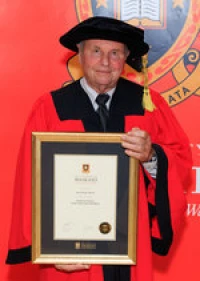
Honorary Doctorate conferred 27 June, 2017
Ian is a civil engineer who has helped improve our understanding of flow regime, hydrology, riverine habitats and their relationship to freshwater aquatic populations. He has also used his knowledge and skills to assist staff on graduate programmes at the University of Waikato.
Beginning his career with the Ministry of Works and Development, one of Ian’s first studies was the 100 Rivers Study, with crews of divers performing underwater counts to collect data on trout in more than 100 New Zealand rivers. The resulting analysis still forms a useful and unique database and is part of Ian’s extensive publication record.
As well as providing advice on the biological implications of flow regime alteration and environmental flow requirements, Ian also developed a unique software package for determining the way in which flow changes would affect habitat requirements, collaborating internationally to develop the software in the science that has become known as eco-hydraulics.
Emeritus Professor Charles Daugherty, ONZM
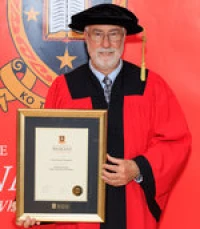
Honorary Doctorate conferred 27 June, 2017
Emeritus Professor Charles Daugherty’s work in biology has had a significant impact on the preservation of New Zealand’s tuatara, skink and gecko populations. He maintains strong links with iwi and has worked closely with the University of Waikato’s Environmental Research Institute to advance the science of urban ecology.
Professor Daugherty has worked with the Department of Conservation, many postgraduate and post-doctoral students, international colleagues and staff at San Diego Zoo to study the biology of tuatara and support their conservation, in particular how they might be threatened or respond to climate change. His work supervising reproductive programmes has also resulted in the restoration of small populations and the establishment of completely new populations of tuatara.
As a Fellow of the Royal Society of New Zealand, an Officer of the New Zealand Order of Merit, senior editor of the Journal of the Royal Society of New Zealand, a semi-finalist for the Kiwibank New Zealander of the Year and a trustee and board member of several organisations, Professor Daugherty has provided outstanding service to New Zealand in the fields of ecology and conservation biology.
King Tūheitia
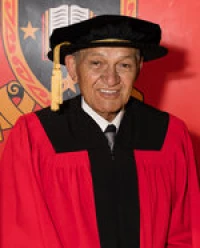
Honorary Doctorate conferred 8 September, 2016
King Tūheitia is the seventh monarch of the Kīngitanga movement, acceding to the throne in 2006. Today the Kīngitanga continues to operate as a powerful expression of Māori unity and as one of New Zealand's most enduring political institutions. King Tūheitia has continued this tradition, dedicating his life to the service of others and to the continuation of the Kīngitanga movement.
At an international level, King Tūheitia has led delegations across the Pacific and beyond, maintaining important political and indigenous relationships across the world.
He is a strong advocate for the arts, language and culture, as well as for Māori interests in matters of national significance.
Locally, King Tūheitia is the host of Tūrangawaewae marae, overseeing gatherings great and small. These include the annual Tūrangawaewae Regatta, celebrating the history and heritage of Ngāruawāhia and the Kīngitanga.
King Tūheitia also has a strong relationship with the University of Waikato, supporting its vision of strengthened relationships with Waikato, Tainui and the Kīngitanga.
Emeritus Bishop Denis Browne, CNZM
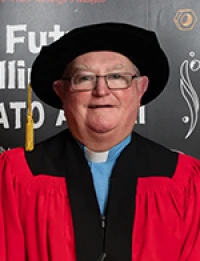
Honorary Doctorate conferred 21 April, 2016
Ordained in 1962, Emeritus Bishop Denis Browne has served as a priest in Auckland and Gisborne, and as Bishop of Auckland and Hamilton. He was a missionary priest in the Pacific Islands for several years from 1975, and in 1977 Pope Paul VI appointed him the third Bishop of the Cook Islands. As Bishop of Hamilton he was committed to enhancing the educational performance of the schools in his diocese, and was instrumental in appointing high-achieving school leaders and upgrading facilities to meet community expectations.
He has received several awards and accolades for his service, including receiving a Doctor of Divinity degree from the Vatican – an honorary degree denoting ordination as a bishop. In 2001 he was named a Companion of the New Zealand Order of Merit for his services to the community.
Archbishop Emeritus Sir David Moxon
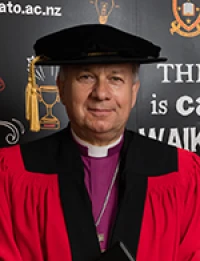
Honorary Doctorate conferred 21 April, 2016
In 1993 Sir David became the youngest bishop of his generation when he was consecrated in Hamilton. Throughout his 20-year tenure as Bishop of Waikato, Sir David was committed to several social and political causes, and alongside Emeritus Bishop Denis Browne he supported the establishment of the Te Ara Hou Christian Social Services Village in Hamilton.
In 2006 he was elected Archbishop of the New Zealand dioceses – the seven dioceses that make up Tikanga Pākehā of the Anglican Church of Aotearoa New Zealand and Polynesia, and then became a primate and Archbishop of this church in 2008.
In 2013 he became the Archbishop of Canterbury’s Representative to the Holy See and director of the Anglican Centre in Rome. That same year he was named Archbishop Emeritus of the Anglican Church in Aotearoa and New Zealand.
Emeritus Professor Roy Crawford, CNZM
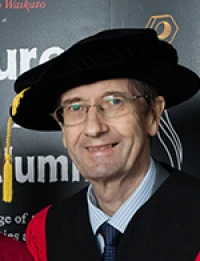
Honorary Doctorate conferred 19 April, 2016
Emeritus Professor Robert (Roy) Crawford led the University of Waikato as Vice-Chancellor for 10 years, completing his term in December 2014. Irish-born, Emeritus Professor Crawford turned down a promising football career to become an academic, completing a BSc, PhD and a DSc at Queen’s University Belfast. His research focus was mechanical and process engineering; his speciality was polymers, and moulded plastics in particular.
He published nine books and more than 250 articles and was awarded more than a dozen international prizes and awards for his research. For more than a decade, while also holding down academic positions, Emeritus Professor Crawford was Director of Technical Services for ARM – a leading industry association in the USA. He was elected to their Hall of Fame in 2007, one of only four non-Americans to receive the honour.
He was Professor of Mechanical Engineering at the University of Auckland and Pro Vice-Chancellor Research and Development at Queen’s University in Belfast before taking on the role as Vice-Chancellor at Waikato.
During his 10-year tenure he led the evolution of a strategic partnership with Bay of Plenty tertiary institutions and guided the early planning for the new campus development in Tauranga. He oversaw almost $100 million of building projects on campus in Hamilton and played a key role in focusing the University on an excellence agenda.
Morehu Ngatoko Rahipere, MNZM
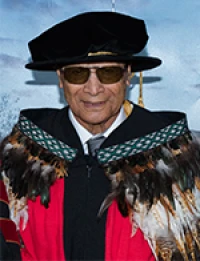
Honorary Doctorate conferred 20 October, 2015
Morehu Ngatoko Rahipere MNZM, a Tauranga kaumātua has spent decades working for his people and has led many initiatives linked to the University of Waikato, including the establishment of the Te Kotahitanga research programme in Te Kura Toi Tangata Faculty of Education.
He is widely regarded as an acknowledged leader, an exponent of tribal lore and narratives, a man of mana and a formidable orator. He is a strong advocate of the long-standing relationship between Ngāti Ranginui and the Kīngitanga.
Dr Ngatoko Rahipere was instrumental in advancing the return of Mauao (Mount Maunganui) to the people and his expertise and knowledge in tikanga and kawa has ensured the mountain is protected and its cultural integrity is maintained.
He has given exemplary service to his community of Tauranga Moana; as college kaumātua to Tauranga Boys' College - progressing the building of a school marae; he supports Tauranga Girls' College; was central to establishing the partnership between Western Bay of Plenty Primary Health Organisation and Ngāti Ranginui; supports the Māori Health Rūnanga; the Christian Education Trust and the Bethlehem Campus and is actively involved with the kaumātua forum of Tauranga City Council.
Richard 'Dick' Tonks, MNZM
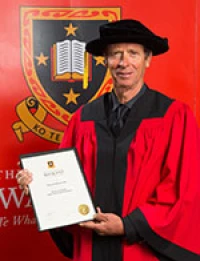
Honorary Doctorate conferred 15 April, 2015
Richard 'Dick' Tonks is one of New Zealand's most successful rowing coaches. He was born in Whanganui and as a rower, won a silver medal at the 1972 Olympics in Munich in the coxless four.
After retiring as a competitive rower he turned to coaching, initially working nights so he could coach during the day. Dr Tonks has coached New Zealand rowing crews at the 1996, 2000, 2004, 2008 and 2012 Olympic Games and has been hugely influential on the careers of some of our best rowers, including Philippa Baker, Brenda Lawson, Rob Waddell, Hamish Bond, Eric Murray, Mahe Drysdale, and Caroline and Georgina Evers-Swindell.
He has won five Halberg awards for coach of the year and was voted International Rowing Federation coach of the year and world rowing coach of the year in 2005, 2010 and 2012.
Rowers under his guidance have won around 30 Olympic and World Championship medals since 2004, bringing immeasurable amounts of pride to the country and some of our most memorable sporting moments.
In the 2003 New Year Honours he was made a Member of the New Zealand Order of Merit for services to rowing.
Sir Dryden Spring
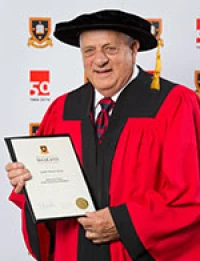
Honorary Doctorate conferred 22 October 2014
Sir Dryden Thomas Spring is one of New Zealand's leading businessmen. He bought his first farm in the heart of the Waikato and has represented farmers on the New Zealand Sharemilkers Association, Waikato Federated Farmers, was Chairman of the New Zealand Co-operative Dairy Company and then Chairman of the New Zealand Dairy Board for ten years.
He has received numerous awards and appointments for his work, culminating in 1994 when he was Knighted for services to the dairy industry. Sir Dryden has been Chairman or director of some of New Zealand's largest companies, was a member of the APEC Eminent Persons Group which drafted the APEC Vision of "Free & Open Trade in the Asia Pacific, and has also served on the APEC Business Advisory Council. He is a Laureate of the New Zealand Business Hall of Fame, a Distinguished Fellow of the Institute of Directors, a Life Member of Waikato Federated Farmers and a Distinguished Fellow of Massey University Academy of Agriculture.
He has also been active with a range of charitable and community organisations. Sir Dryden has spent a lifetime making significant contributions, characterised by excellence, persistence and intelligence, to the Waikato, New Zealand and international commerce and he is a worthy recipient of the University of Waikato's highest honour of Honorary Doctorate
Warren Scotter
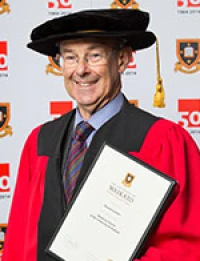
Honorary Doctorate conferred 22 October 2014
A specialist in litigation, Warren Scotter is a senior partner at Hamilton's Harkness Henry law firm. He is known in the law fraternity for his kindness and his dedication to the legal profession. He has also been an unfailing supporter of the University of Waikato's Te Piringa Faculty of Law, instigating and supporting the Faculty's annual Harkness Henry Lectures, which have been running for more than 20 years.
Throughout his career, Dr Scotter has taken active roles in law administration, as president of the The Waikato – Bay of Plenty District Law Society Council, chair of the High Court Practice Committee, chair of the society's Complaints Committee, councillor of the New Zealand Law Society and a member of the New Zealand Law Society's executive. More recently, he has chaired the Law Society's Standards Committee for Waikato – Bay of Plenty.
He was also instrumental in improving the quality of legal standards regulation and has provided support for many new lawyers entering practice in the region. In his day to day practice, Dr Scotter has appeared in hundreds of cases, frequently acting for the underdog. He is acknowledged as always being fair and balanced, and as a principled and respected lawyer.
Dame Susan Devoy
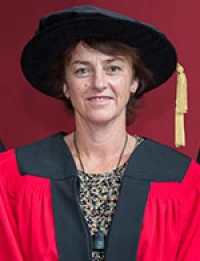
Honorary Doctorate conferred 19 April 2013
Dame Susan Devoy was the number one world women's squash player for more a decade, winning four World titles and eight British Opens.
She was named New Zealand Sportswoman of the Year in 1985, 1987 and 1988. She was awarded an MBE at 21 and at 34 was made a Dame Companion of the New Zealand order of Merit.
Dame Susan is a patron of the Muscular Dystrophy Association and has worked on the government-appointed taskforce on sport, fitness and recreation. She has been a supporter of mental health campaigns, been a chair of the Halberg Trust and continues as its Bay of Plenty representative.
She is a trustee on the Tauranga Energy Consumer Trust, has supported campaigns for international immunisation for children, and is currently a trustee and supporter of the National Centre of Cycling being built in Cambridge.
In March 2013, Dame Susan was appointed New Zealand's Race Relations Commissioner.
Bernie Crosby
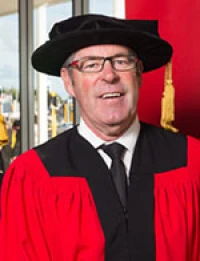
Honorary Doctorate conferred 18 April 2013
Bernie Crosby founded Prolife Foods with his wife Kaye in the 1980s and the couple have grown the business into one of New Zealand's largest privately owned and operated food businesses. The company employs more than 600 people and imports, manufactures and markets nuts, dried fruit, snacks, cereals and confectionary products, supplying products to supermarkets in both New Zealand and Australia.
Dr Crosby is known for developing and maintaining excellent relationships with stakeholders and staff and has been recognised for his leadership with many awards.
He has held directorships at several other companies and also contributes to the community through his support of the Hamilton Gardens, the MESH Sculpture Trust, the New Zealand Painting and Printmaking Award and the Coromandel Westpac Rescue Helicopter Trust.
He has also initiated a campaign to raise $1 million over five years to fund neurological research into Parkinson's disease.
Gordon Stephenson
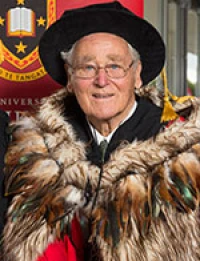
Honorary Doctorate conferred 16 April 2013
Gordon Stephenson is a farmer and conservationist from Waotu, near Putaruru. He is the founder of the QEII National Trust, established in 1977, and became the first person to covenant land under the trust.
Today more than 3500 covenants have been registered covering more than 100,000 hectares. He's been on the national body of Federated Farmers and Forest and Bird and had leading roles in organisations such as the Waikato Conservation Board, the Maungatautari Ecological Island Trust, the New Zealand Landcare Trust and the South Island High Country Review Committee.
He is the instigator of the National Farm Environment Awards and has been involved with countless other farming and environmental organisations for more than 50 years.
In 1998 he became a Companion of the New Zealand Order of Merit and in 2000 he received a Biodiversity Accolade award at the launch of the New Zealand Biodiversity Strategy.
He is a Distinguished Life Member of Forest and Bird, an Honorary Member of Rotary and an honorary kaumatua at Pikitu Marae, Waotu.
See a full list of our Honorary Doctors in the University Calendar